October 2020 national eResearch newsletter
Welcome to the October 2020 National eResearch Newsletter
Message from AeRO
eResearch Australasia begins in just a few days using the exciting new online format! I’m looking forward to all our wonderful speakers but perhaps most intrigued this year to experience the virtual discussions BoFs and networking activities. With a packed program and almost 500 delegates I’m planning a lot of coffee refills, but remember the meeting hub, exhibition floor, posters, and recorded presentations will all remain available outside core hours and after the event.
Sam Moskwa, AeRO CEO
 |
eResearch Australasia 2020 Online: Starts Monday
The eResearch Australasia 2020 conference will be delivered in an exciting online format!
eResearch Online will offer delegates the opportunity to engage, connect, and share their ideas and exemplars concerning new eResearch capabilities, and how information and communication technologies help researchers to collaborate, collect, manage, share, process, analyse, store, find, understand and re-use data and information.
Registrations are still open via: https://conference.eresearch.edu.au/2020-registration/.
|
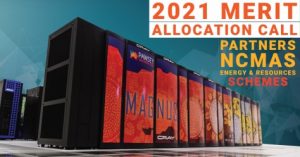 |
Pawsey Partner, Energy and Resources Allocations Close 19-Oct
Calls are open for supercomputing time on Magnus at the Pawsey Supercomputing Centre in 2021. If you are interested in using supercomputing resources for your meritorious research between January and December in 2021, please consider applying before it closes on 19-Oct.
The 2021 calls are for the following schemes:
For more information about the call for allocations, visit this page: https://pawsey.org.au/calls-for-supercomputing-time-in-magnus-are-now-open/. |
 |
NCMAS Call for 2021 Applications Closes 26-Oct
The National Computational Merit Allocation Scheme (NCMAS) is the premier allocation scheme for access to Australian national supercomputing facilities for meritorious research. The NCMAS provides access, based on research and computational merit, for researchers at Australian universities and publicly funded research agencies. For the 2021 round over 350 Million service units will be available. Call closes 26-Oct.
The 2021 round will allocate time for researchers on NCI Australia’s Gadi, Pawsey Supercomputing Centre’s Magnus, The University of Queensland FlashLite and The Multi-modal Australian ScienceS Imaging and Visualisation Environment (MASSIVE).
For more information about the call for allocations, visit this page: https://my.nci.org.au/mancini/ncmas/2021/.
|
 |
Australian eResearch and Data Skills Summit: 26-Oct
ARDC’s virtual Australian eResearch and Data Skills Summit will take place form 26 – 30 Oct, in a flexible format of 2 x 1-hour sessions a day, covering the discovery, coordination, design, development and delivery of digital skills training and resources for research.
The full program is now available on the updated website: https://ardc.edu.au/events/ardc-australian-eresearch-and-data-skills-summit-2020/. |
| Indigenous Data Sovereignty Webinar (APAC): 27-Oct
Join the Global Indigenous Data Alliance (GIDA), Te Mana Raraunga – The Māori Data Sovereignty Network, the US Indigenous Data Sovereignty Network (USIDSN), and ORCID in this Indigenous Data Sovereignty Webinar in Asia Pacific timezones.
Tuesday, 27 October 2020: 11:00 Auckland, Wellington 10:00 Sydney, Melbourne 09:00 Brisbane 06:00 Perth, Beijing
For more information and to register, go to: https://register.gotowebinar.com/register/3900249628823747598. |
|
 |
Connect with the Australian BioCommons Team: from 4-Nov
The Australian BioCommons team is looking forward to connecting with their many project partners and potential new collaborators at eResearch Australasia. With so many projects underway involving a broad range of institutions and researchers from the Australian eresearch community, there are plenty of ways to hear about the latest developments at the conference. Here’s a summary: www.biocommons.org.au/eresearch2020.
We’re also delighted to partner with AARNet to offer some new workshops for biologists who need extra support with data movement, and assist Galaxy Australia to run national workshops that introduce online data analysis for life science researchers (from 4-Nov): https://www.biocommons.org.au/events. |
 |
ARDC Translational Research Challenges: 16-Nov
The ARDC has launched its Translational research data challenges initiative to address problems such as disaster resilience, crop yields or obesity. See https://ardc.edu.au/collaborations/strategic-activities/translational-research-data-challenges/.
The first challenge is Bushfire Data Challenges and you can now register your interest (closes 16-Nov).
|
 |
AARNet Train-the-Trainer Workshops
AARNet is pleased to announce that bookings are open for our Train-The-Trainer Workshops. As the network provider for Australia’s universities and research institutions, AARNet’s aim is to support all researchers to get the most of the network and the technologies available to support their work. Training is one of the ways we do this. Our training is focused on workshops that demonstrate how to use the services we provide, such as CloudStor and SWAN, and improve the sector’s understanding of the capabilities of networks and data movement.
Find out more or make a booking: https://news.aarnet.edu.au/aarnet-train-the-trainer-workshops/. |
 |
Persistent Identifiers: PIDapalooza Festival: 27-Jan-21
Submissions are now open for PIDapalooza, the open “festival” of persistent identifiers. Also known as PIDs, persistent identifiers such as ORCID and DOI are a core component of world class research infrastructure. As specified in the FAIR Data Principles, PIDs provide global methods to uniquely identify and connect entities in the research system such as researchers, funders, organisations, articles, datasets, software, and samples.
PIDapalooza 2021 will be a 24-hour nonstop PID party happening virtually and around the world in January.
More information at https://www.pidapalooza.org/ or email Natasha.Simons@ardc.edu.au (APAC PIDapalooza Party Planning Committee). |
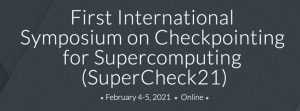 |
Checkpointing for Supercomputing: 4-Feb-21
NERSC is hosting the First International Symposium on Checkpointing for Supercomputing (SuperCheck21), which will be held February 4-5, 2021. This free event will be held online and will feature the latest work in checkpoint/restart research, tools development, and production use.
Checkpoint/Restart (C/R) is critical for fault-tolerant computing in high-performance computing (HPC). While there has been much research and development on C/R and C/R tools, few HPC end users are able to use them in production workloads. Although research codes often demonstrate promising C/R capabilities, there are no feasible C/R options for diverse production workloads, especially on cutting-edge HPC systems.
To register, click here: https://ckpt-symposium.lbl.gov/home. |
 |
EOI for Pawsey Merit Allocation Committee
The Pawsey Partner and Energy & Resource (E&R) merit allocation committees are responsible for allocating shares of the Magnus supercomputer to meritorious research projects based on a consideration of the project’s requirements, merit of the project and overall resources available.
Pawsey is seeking additional committee members to support the current committee for a term of one to two years. Expressions of interest are welcomed from appropriately qualified researchers in all fields of computationally- and data-intensive research including astronomy, chemistry/materials, computational fluid dynamics, engineering, environment/climate/earth system science, genomics, geosciences, molecular dynamics, and physics.
More information and to apply: https://jobs.csiro.au/job/Perth%2C-WA-Software-Research-Engineer-%28Scientific-Visualisation%29/630806200/?locale=en_GB. |
 |
ARDC Unlocks Cross-Disciplinary Insights
Through the Cross-NCRIS Data Assets program, the ARDC is helping to bring together data from diverse facilities and unlock highly valuable cross-disciplinary insights.
See: https://ardc.edu.au/news/combining-forces-across-ncris-for-new-insights/. |
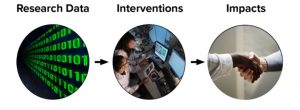 |
ARDC Studies Impact of Research Data
ARDC has commissioned a study which explores the non-academic impact of research data.
One key finding is that “research data itself rarely contributes directly to any impact”, highlighting the need for data processing, analysis and curation to leverage value.
See: https://ardc.edu.au/resource/investigating-the-link-between-research-data-and-impact-phase-ii/. |
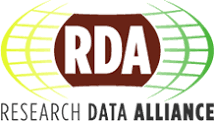 |
RDA New FAIR for Health WG
The newly formed RDA FAIR for Health Research Performing Organisations working group is looking for new members. They will also be hosting a session at the next RDA Plenary.
Find out more here: https://www.rd-alliance.org/groups/raising-fairness-health-data-and-health-research-performing-organisations-hrpos-wg. |
 |
Predicting Bushfires
Australian researchers have now developed remarkably accurate models to predict potential fire areas.
Using the ARDC NeCTAR Research Cloud, scientists at Monash University and Australian National University (ANU) have employed applied machine learning techniques and satellite imaging to create models to predict the moisture content of vegetation, a major determinant of bushfires.
See: https://ardc.edu.au/news/researchers-creating-models-to-assess-bushfire-risk/. |
 |
NCI Research: A New Understanding of Global Ocean Currents
Ocean gyres on the scale of continents have a major effect on daily weather, seasons and extreme weather events. Until now, they were thought to be caused solely by surface winds. In an ambitious computational study run at NCI using two very different kinds of models, Dr Bishakhdatta Gayen and Professor Andy Hogg from The Australian National University have found that, amazingly, the heating and cooling of the ocean water can, on its own, cause gyres to form.
Read more: http://nci.org.au/research/research-highlights/a-new-understanding-global-ocean-currents. |
 |
NCI Welcomes ACCESS-NRI Funding Announcement
NCI Australia warmly welcomes the Federal Budget announcement of $7.6 million of funding for ACCESS, the Australian Community Climate and Earth System Simulator, to become a National Research Infrastructure. Congratulations to the Australian climate and weather research community for this recognition of their role as an essential element of a safe and successful Australia. NCI supercomputing power has been pivotal in the development of the ACCESS suite of models since their inception. We look forward to supporting the ACCESS-NRI as it takes the already successful ACCESS models to the next level.
Read more: http://nci.org.au/news-events/news/nci-welcomes-access-nri-funding-announcement. |
 |
HPCwire Readers’ Choice Awards
Each year the HPCwire Readers’ Choice Awards are determined by readers across the HPC community. Voting closed on 12-Oct-20, but we are hoping some of the following projects may win.
Some Pawsey researcher case studies:
Voting took place here: https://www.hpcwire.com/2020-hpcwire-readers-choice-awards-voting-is-open/. |
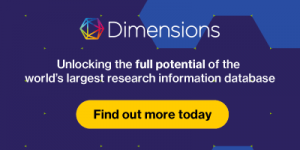 |
Dimensions on Google BigQuery: Breaking Barriers Between Users and Data
We’re very proud to announce that we’re launching the next step in the Dimensions evolution: through our partnership with Google Cloud, the Dimensions database is now available to be analyzed on BigQuery. Without barriers to data access, users gain unprecedented flexibility to analyze Dimensions data, and combine it with their own data, as well as other proprietary and public data sources, to build custom dashboards and reports.
Read here for full details: https://www.dimensions.ai/news/dimensions-partners-with-google-cloud-and-launches-integration-with-bigquery/. |
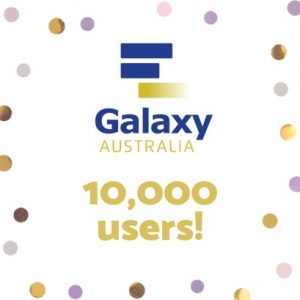 |
Galaxy Australia Hits a Milestone – 10,000 users!
This web-based platform for accessible, reproducible and transparent computational research has rapidly become an indispensable online data analysis tool for biologists who prefer not to code. As of this week, Galaxy Australia is supporting 10,000 researchers to analyse their valuable data, but there is rapid uptake as more features become available every day.
At eResearch Australasia, Galaxy is featured in various talks, a BoF and a poster. Catch up on all the new capabilities and hear how Galaxy Australia is supporting Australian research: https://galaxyproject.org/events/2020-10-eresearch-australasia/. |
 |
ARCOS Containers and Kubernetes Report
The Australian Research Container Orchestration Service (ARCOS) have been working with the national community with the aim of establishing a national Kubernetes service. After much community consultation, the group has just published the first draft of: A National View of Containers and Kubernetes in Research. The paper articulates the challenges and opportunities of Containers and Kubernetes in the Australian Research domain. The paper is available from the ARCOS website. Feedback on the paper and its recommendations is most welcome.
More information is available at: https://arcos.ardc.edu.au/. |
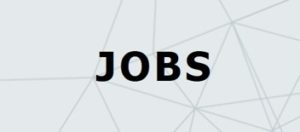 |
eResearch Jobs
AeRO provides details of the latest eResearch job opportunities in the sector. Jobs are posted immediately to https://twitter.com/AeRO_eResearch, and the website at http://aero.edu.au/jobs/ is also updated. This is a free service for the whole eResearch community – to advertise a position, simply email loretta@aero.edu.au. Here are some current vacancies: Program Managers, HSM Systems Administrator, STEM Project Assistant, Researcher Support Specialist, Service Engagement Manager, Senior Project Manager, REANNZ Finance and Office Administrator.
|
Contributions
This newsletter is based on contributions provided by members of the eResearch community, and draws on news articles and newsletters published across the sector. The Newsletter is published around the 16th of each month.
Please send any contributions (max. 100 words, plus a link and image) or pointers to any other relevant articles or newsletters to editor@aero.edu.au
Archives of these Newsletters are held at http://aero.edu.au/newsletters/.
Click HERE to add yourself to the eResearch Mailing List.
Thanks,
—AeRO Newsletter Editor

